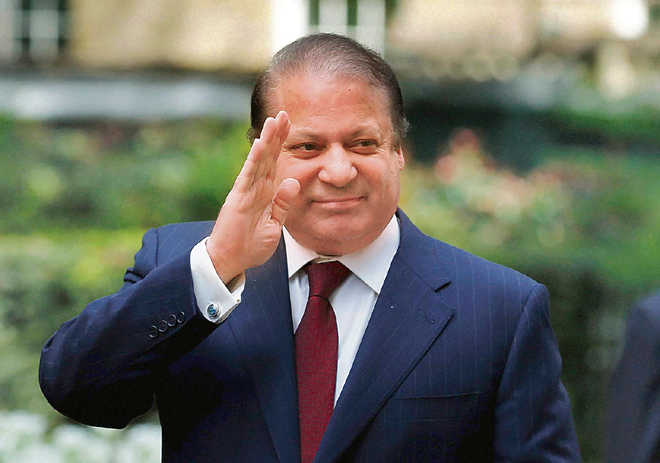
Nawaz Sharif. AP/PTI
TCA Raghavan
Former High Commissioner of India to Pakistan
Disaggregating longer term trends from immediate developments is never easy in Pakistan as the drama of the moment often overrides everything else. Nevertheless, two contradictory processes are most evident amidst numerous others jostling to direct events:
1 Civil-military balance: The first is a steady accretion of influence around the army chief representing the continued tilting of the civil-military balance in the direction of the latter. This is a process that began in late 2014 and has gathered momentum since. On the way, it has crippled the PML(N) by deposing its charismatic head as Prime Minister. It is easy to overlook the substantive steps the Pakistan military had to take to achieve this outcome. The actions following the Peshawar school attack against Taliban-type fronts in the tribal areas was a source of public gratification and for most Pakistanis, the army had again proved that it was the country's final and also ultimate saviour. As public adulation for the army mounted, the civilian government and the PML(N), in particular, found itself between a rock and a hard place. By mid-2017 and with Nawaz Sharif's deposition as Prime Minister, the process had crystallised. The long cycle that began a decade earlier with Musharraf's exit, the growing unpopularity of the army as terrorist attacks spread across Pakistan, the OBL raid etc had ended and the circle was complete.
2 Nawaz Sharif's postures: The second process is equally striking and is personalised and animated by the defiance of the PML(N) and in particular of Nawaz Sharif. His postures against hidden forces at work have evoked a public response that is surprising in itself. His accusations of a "judicial martial law' have in turn spawned a new field of analysis for Pakistan that is being termed the 'judicialisation of politics'. His claims that he is a victim of a judiciary military concert have a wide credibility. His party seems to be holding behind him and in the forthcoming General Election, it will be in the curious — but politically strong — position of both being the incumbent government as also the party against the establishment.
These two then are rival popularities and narratives bouncing off each other — almost as if Pakistan wishes to embrace two contradictory ideas simultaneously and is unable or unwilling to choose one or the other. Is this muddle also part of Pakistan's 20-year coup cycle — 1958, 1977, 1999….? It is tempting to think so, for who can deny such a possibility given Pakistan's history. Yet it is also a fact that in the past two decades, the Pakistan society has changed a great deal and the leap from precedent to the future is now more difficult and tenuous. Many of its institutions — the judiciary, media, military have matured and changed — and conflicting, working and allying with each other as they interface with parties seems to be the direction of change rather than an old-fashioned coup as was the pattern in the 1990s. This may be a reflection of the deepening of roots of democratisation, howsoever inconsistent and non-linier the process may be in the future.
But for all this, large question marks about the immediate future remain. Will the General Election return results with a strong PML (N) showing as the present response Nawaz Sharif is getting suggests? Or will the PML (N) be cut to size and a combination of the other national parties rise to the top? A shaky coalition is what the military will be most comfortable with and which would be infinitely superior to a PML(N) thirsty for revenge and keen to rehabilitate Nawaz Sharif. There is going to be no clear answer to these questions for the future is untested terrain in Pakistan, as indeed elsewhere.
Indo-Pak ties
Where does this leave India-Pakistan relations, stuck as they are in the long impasse that developed in the first half of 2016? This was the result of the Pathankot air base terrorist attack, the Kulbhushan Jadhav case and the events that followed the detection and elimination of the Jihadi poster boy Burhan Wani in Kashmir Valley. But important as each of these were individually and collectively, it is perhaps also valid to speculate that the impasse continued longer than could have been anticipated on account of Nawaz Sharif being deposed in July, 2017.The impact of that on India-Pakistan relations should not be underestimated for his is the most powerful voice to have emerged in Pakistan in favour of reset of a fundamentally flawed and troubled relationship. How his party fares in the next election, what will be the architecture of the government and what happens in Pakistan in the interregnum are questions whose answers will impact on the country's relations with India.
In May, 2014, when PM Nawaz Sharif attended the swearing-in of the new government in India, it did appear that the strength of the ruling parties in both countries had enabled the emergence of a viable negotiating space. What could not have been anticipated was that as during earlier governments, foreign policy had no real answer to dealing with internal civil-military turbulence in Pakistan. This issue will continue to bedevil India-Pakistan relations and the frustrations of policymaking with Pakistan will remain our inability to influence the one single factor that has such a major bearing on bilateral ties. Nevertheless, keeping engagement on hold, much like all other policies, has a shelf life. As Pakistan heads to elections, it is also time to keep an eye on other clocks and choose from a menu of options, none of which may be to our liking.



























